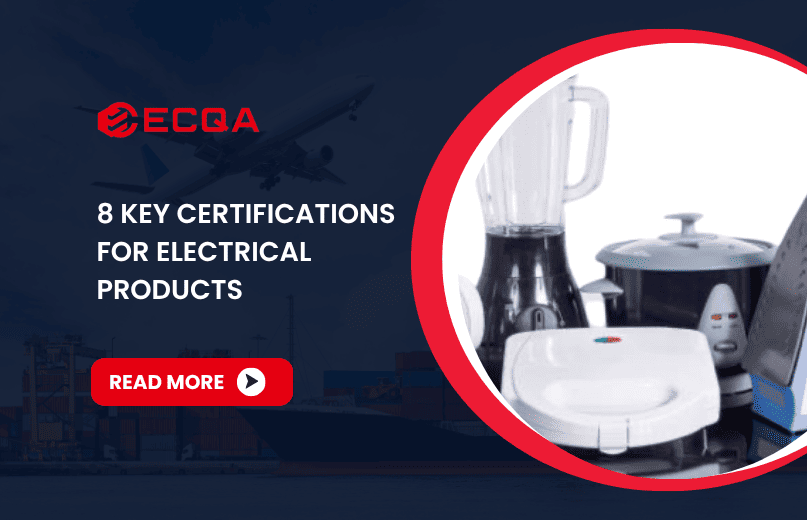
Top 8 Key Certifications for Electrical Products
The global electrical product market is heavily regulated to ensure safety, performance, and consumer protection. Manufacturers, importers, and distributors must comply with key certifications before entering specific markets. Each region enforces distinct certification schemes, making it critical to understand the nuances of each system to avoid costly delays, recalls, or legal challenges.
This guide highlights the top 8 key certifications for electrical products across major markets, providing a clear roadmap for global compliance.

CE Marking (Europe)
CE Marking is a mandatory conformity mark for most electrical products sold within the European Economic Area (EEA). It indicates that a product complies with EU legislation on safety, health, electromagnetic compatibility, and environmental protection. The CE mark allows products to circulate freely across EU member states without additional national approvals.
Scope
Applies to a wide range of electrical products, including:
- Low-voltage equipment (50–1000V AC and 75–1500V DC)
- Household appliances (refrigerators, washing machines, air conditioners)
- Lighting products (LED systems, luminaires, lamps)
- IT and telecommunication equipment (computers, servers, networking devices)
- Power tools and industrial machinery
- Consumer electronics (televisions, audio systems, personal gadgets)
- Products regulated under EU directives such as the Low Voltage Directive (LVD), EMC Directive, RoHS, and Ecodesign
UL / cUL / CSA (North America)
UL (Underwriters Laboratories), cUL, and CSA (Canadian Standards Association) marks are widely recognized safety certifications for electrical products in the U.S. and Canada. These marks demonstrate that products comply with North American safety and performance standards, giving assurance to regulators, retailers, and consumers.
Scope
Covers a variety of electrical products, including:
- Household appliances (microwaves, refrigerators, air conditioners)
- Power tools and industrial equipment
- Consumer electronics (computers, televisions, mobile devices)
- Lighting equipment (fixtures, LED systems, luminaires)
- Electrical cables, wiring devices, switches, connectors
- IT and telecommunication equipment
- Products subject to energy efficiency verification programs
CCC (China Compulsory Certificate)
The CCC mark is a mandatory certification for many electrical products sold in China. It verifies that products meet Chinese national safety, health, and environmental standards.
Scope
Applies to products listed in the official CCC Catalogue, including:
- Household appliances (air conditioners, washing machines, refrigerators)
- IT equipment (computers, monitors, printers, servers)
- Industrial machinery and power tools
- Lighting products (LED lamps, luminaires, fixtures)
- Electrical cables, wires, switches, sockets, circuit breakers
- Audio-video equipment and communication devices
- Consumer electronics in multiple categories
PSE Mark (Japan)
The PSE Mark (Product Safety Electrical Appliance and Material mark) is mandatory for electrical products in Japan under the DENAN Law. It confirms compliance with Japan’s electrical safety standards.
Scope
Divided into two categories:
- Specified Products (Category A, diamond mark): power cords, AC adapters, heaters, water heaters, transformers, and other high-risk components (require third-party certification).
- Non-Specified Products (Category B, round mark): computers, chargers, lighting devices, audio-video equipment, small appliances (require self-declaration and marking).
IECEE CB Scheme
The IECEE CB Scheme, managed by the International Electrotechnical Commission (IEC), is an international system for mutual recognition of product safety test reports. It streamlines global market entry by reducing the need for duplicate testing.
Scope
Covers a wide range of electrical and electronic products, including:
- Household appliances
- IT and telecom equipment
- Lighting equipment (lamps, LED systems, luminaires)
- Power tools and industrial machinery
- Audio-video equipment
- Medical electrical devices
- Electrical components (switches, circuit breakers, connectors, cables)
SASO (Saudi Arabia)
The Saudi Standards, Metrology and Quality Organization (SASO) regulates electrical product certification in Saudi Arabia. Products must comply with SASO technical regulations and be registered through the Saber platform.
Scope
Applies to:
- Household appliances (air conditioners, washing machines, refrigerators)
- Lighting products (LED lamps, luminaires, fixtures)
- Consumer electronics (TVs, audio systems, personal devices)
- Power tools and industrial electrical equipment
- Electrical cables, wires, plugs, components
- IT and telecommunications equipment
UKCA Marking (United Kingdom)
The UKCA (UK Conformity Assessed) Mark is required for most electrical products placed on the market in Great Britain after Brexit. It confirms compliance with UK legislation on safety, health, EMC, and environmental standards.
Scope
Covers a broad spectrum of products, including:
- Low-voltage equipment (50–1000V AC and 75–1500V DC)
- Household appliances (refrigerators, washing machines, kitchen devices)
- Lighting products (lamps, LED systems, luminaires)
- IT and telecom equipment (servers, routers, computers)
- Power tools and industrial machinery
- Consumer electronics (televisions, entertainment systems, personal devices)
- Products regulated under UK equivalents of EU directives (LVD, EMC, RoHS, Ecodesign)
Note: CE marking is still accepted in Great Britain during the transition period.
FCC (United States)
The FCC (Federal Communications Commission) certification is mandatory for electronic devices sold in the U.S. that emit radio frequency energy. It ensures that devices do not cause harmful electromagnetic interference and comply with communication safety requirements.
Scope
Covers:
- IT and telecom equipment (Wi-Fi routers, servers, mobile phones)
- Radio and wireless communication devices
- Consumer electronics (TVs, gaming consoles, computers)
- Audio-video equipment with wireless features
- Industrial equipment with wireless control
- IoT devices and smart home systems
- Any product emitting intentional or unintentional RF energy
To succeed in the competitive electrical products industry, certification compliance must be at the core of your global market strategy. By ensuring your products meet these international requirements, you can avoid costly delays, ensure safety, and build customer trust. Partner with ECQA for compliance and certification services now.

 Request Free Sample Report
Request Free Sample Report